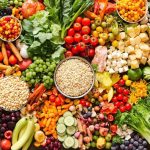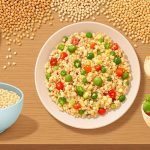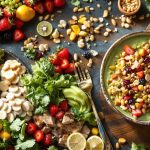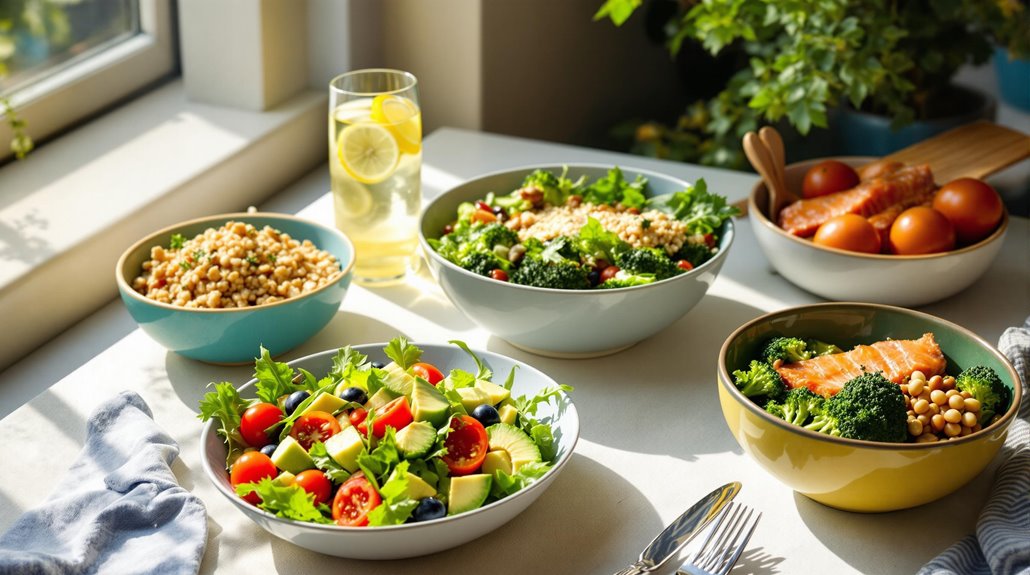
To maintain a balanced diet, start by embracing food variety. Mix seasonal fruits, vegetables, legumes, whole grains, nuts, and lean proteins to pack your meals with essential nutrients. Next, master portion control by using smaller plates and engaging in mindful eating, such as recognizing hunger cues and eating slowly. This helps you avoid overeating and guarantees better digestion. Finally, prioritize nutrient-rich choices like whole grains, lean proteins, and healthy fats to sustain energy and promote overall health. These three tips provide a foundation for superior nourishment and a pathway to discovering more about a balanced lifestyle.
Embrace Food Variety
Embrace Food Variety
A well-rounded diet hinges on embracing food variety to guarantee your body gets all the essential nutrients it needs. When you engage in seasonal eating, you automatically introduce a broader spectrum of nutrients. Imagine the liberation of going beyond your usual fare and romancing the idea of trying new fruits and vegetables that throng local markets as seasons change. Not only does this practice amplify nutrient coverage, but it also fortifies your gut health by diversifying your microbiome, which is pivotal for preventing diseases and supporting weight management. Incorporating foods like vegetables, fruits, legumes, whole grains, nuts, and lean proteins helps ensure a balanced intake of essential nutrients. Consider incorporating organic food into your diet; it is produced without synthetic pesticides, which may benefit those concerned about pesticide residue. Let’s not overlook the thrill of cuisine exploration. By indulging in different culinary traditions, you broaden your palette and nutritional intake. It’s like taking a global tour without leaving your kitchen. This adventure introduces foods like almonds and oranges, each bringing unique nutrients such as vitamin E and C, respectively. This isn’t merely about eating more—it’s about the quality embedded in that variety. By doing so, you shun nutritional deficiencies and enhance your mortality odds.
Master Portion Control
Mastering portion control is an essential skill for maintaining a balanced diet and achieving your health goals. Embrace the liberation that mindful eating can bring into your life by recognizing how portion sizes affect your well-being. Start by utilizing visual aids to reclaim control. Swap larger plates for ones about 9 inches across. This shift tricks your brain into feeling satisfied with less. A kitchen scale can be an invaluable tool in providing precise measurements, ensuring you stay on track with your portion sizes. Break down your plate into halves and quarters besides using hand measurements as intuitive tools. Remember that hydration supports metabolism and plays a vital role in portion control by preventing overconsumption due to mistaking thirst for hunger.
Here’s a handy guide:
| Portion Control Tool | Technique | Benefit |
|---|---|---|
| Smaller Plates | Use plates < 9 inches | Reduces portion sizes |
| Half-Plate Method | Fill half with vegetables | Guarantees veggie intake |
| Hand Measurements | Use palms and fists | Easy portion estimation |
Portion control’s beauty lies in its ability to maintain energy levels, aid in weight management, and support blood sugar control. Make it practical by portioning snacks, refusing large servings, and dining distraction-free. Embrace slow eating and wait 20 minutes before seconds. Recognize hunger cues and let mindful eating guide your choices, guaranteeing balanced digestion and ideal energy levels. Empower yourself through consistency and portion awareness to create a liberated, healthful daily nutrition routine.
Prioritize Nutrient-Rich Choices
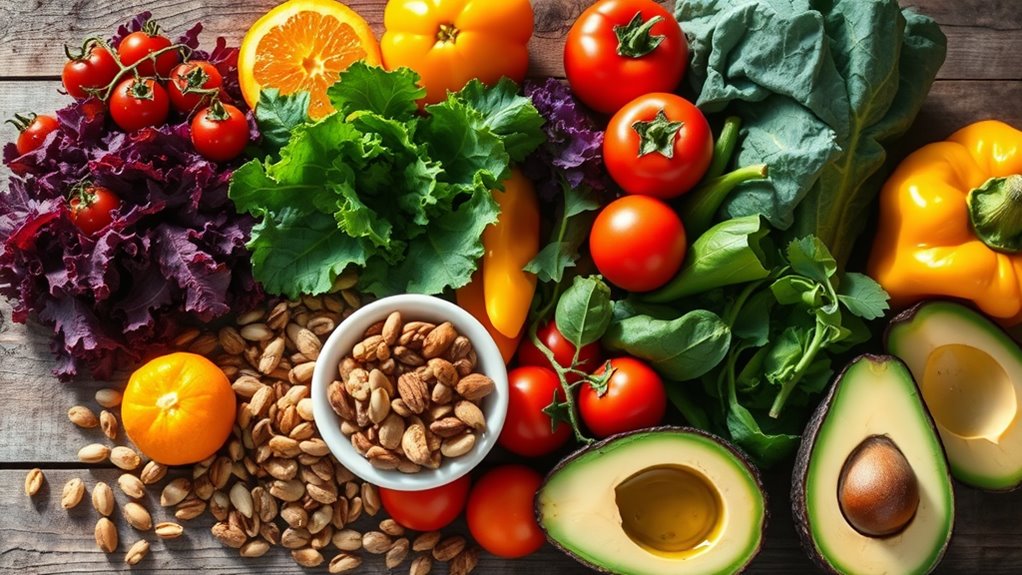
To prioritize nutrient-rich choices in your diet, focus on foods that deliver a wide array of essential vitamins, minerals, and other beneficial compounds. By embracing nutrient density, you reveal the potential to nourish your body efficiently and enjoyably.
Immerse yourself in the vibrant world of seasonal produce, where freshness meets the peak of nutrient content. Choosing seasonal fruits and vegetables like berries, citrus fruits, and dark leafy greens such as kale and spinach can infuse your meals with powerful vitamins A and C, fiber, and potassium. Foods rich in soluble fiber help increase satiety and reduce overeating, further promoting a balanced diet. To maintain excellent hydration, it’s crucial to consume 8 to 12 cups of water daily, which is essential for various bodily functions.
Boost your meals with the rich flavors of whole grains like quinoa and brown rice, which offer fiber and complex carbohydrates to fuel your freedom-loving adventures.
Lean proteins such as fish, poultry, and plant-based powerhouses like lentils and tofu provide essential amino acids without burdening you with excess fat. Don’t shy away from the creamy goodness of low-fat dairy products, as they serve as a valuable source of calcium, vital for strong bones.
Integrate healthy fats from nuts, seeds, and avocados into your diet to support overall well-being. You hold the key to a liberated lifestyle by making nutrient-rich food choices every day.
Goal: Achieve Optimal Nourishment
A balanced diet is crucial for maintaining health and achieving maximum nourishment. Adopting healthy eating habits involves making informed choices about the foods and beverages consumed daily. This includes prioritizing starchy and whole grain foods, which provide valuable nutrients like fiber, protein, and B vitamins that support energy levels and digestive health. Wholegrain options offer more fibre and nutrients than their white counterparts, making them a smart choice for a nutrient-rich diet.
Opting for whole grains such as brown rice and oatmeal not only aids in sustaining energy but also fortifies the diet with essential nutrients that contribute to overall well-being. Consuming a balanced diet rich in nutrients supports overall health without excessive calorie intake, aligning with effective weight management strategies.
Integrating variety in protein sources is another fundamental aspect of a balanced diet. Lean proteins from sources like legumes, nuts, seeds, and lean meats offer important amino acids and nutrients while managing fat intake.
Including seafood twice a week can boost the intake of healthy omega-3 fatty acids. While nuts and seeds are nutrient-dense, consuming them in moderation helps keep fat intake balanced. By incorporating these diverse protein options, individuals can meet dietary needs while supporting muscle repair and growth.
Achieving maximum nourishment also involves mindful consumption of fats. Choosing unsaturated oils, such as olive or canola oil, over saturated fats can help maintain healthy cholesterol levels.
In addition, enhancing the flavor of meals with herbs and spices reduces the need for added fats and salt, promoting heart health. Finally, staying hydrated with water and unsweetened beverages helps maintain hydration without the excess calories found in sugary drinks.

